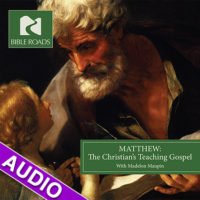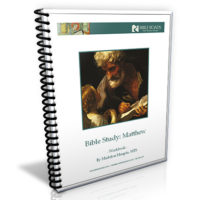What better place for individuals or Bible Study groups to look than the Scriptures for reasons to be grateful this November season of Thanksgiving. That’s why the three blogs this month have a theme of gratitude but you might be surprised by the selections! The first is the temptations of Jesus in the wilderness, that titular event that launches his healing, teaching and preaching ministry.
Why these temptations as a topic for thanks? We’re grateful Jesus was decidedly victorious, but the three temptations themselves address life’s three largest domains—our domains–and how Biblical prayer helps us meet them. (More on that in a moment.) So Christ Jesus provides a roadmap for us to navigate on the seductions that inevitably come in these three arenas today.
Studying Jesus’ first testing time through the lens of Luke’s Gospel reveals fresh insights that Mark and Matthew don’t provide. After all, Luke tells the reader in his prologue that he will “an orderly account for you” (Luke 1:3, NRSV). And noting the sequence of events, stories and parables, yields fresh insights.
Luke arranges three early major events in Jesus’ career is: ‘baptism-genealogy-temptations’. That’s different from Matthew’s order: ‘genealogy-baptism-temptations’. (Mark omits a genealogy altogether, starts with the baptism and, like Matthew, follows it with the temptations.)
So what can we learn by Luke purposely inserting his genealogy between the baptism and temptations?
Luke’s baptism shows God as the first witness to declare Jesus’ identity as Christ, Messiah, or Son of God. “You are my Son, the Beloved; with you I am well pleased” (Luke 3:22, NRSV).
The genealogy then traces Jesus’ lineage all the way back to Adam, who the Jews believed to be the first man.
Following this declaration, the devil’s first taunt starts with ‘if’:
“The devil said to him, ‘If you are the Son of God’…”(Luke 4:3, NRSV).
The word ‘devil’ comes from the Greek, diabolos, meaning accuser and slanderer, revealing that the devil is trying to defame Jesus’ God-declared identity. So the devil is selling two huge theological points: that Christ is NOT God’s Son, and that Christ is NOT for the whole human race. Luke declares exactly the opposite, showing Christ Jesus is savior for the world–every man, woman and child. That’s why Luke’s Gospel has come to be called ‘the universal Gospel’, as it shows Jesus for all people, especially those who are on society’s margins.
With such insight coming early– by the fourth chapter—the reader or listener is invited to see the remaining twenty chapters (24 total) through this lens of inclusiveness, fairness and equal opportunity for blessing by God and His Christ. No one is left outside of God’s healing love.
Then each temptation represents a domain that affects all of us.
The first one is personal, or even social: having had no food for forty days, the devil suggests Jesus use his divine status to turn stones into bread. Luke shows Jesus resists reducing his ministry to feeding the hungry in a kind of social services effort. The feeding of the 5000 will indeed prove that meeting the human need is very much part of Jesus’ ministry, but through a demonstration of God’s ever-providing love, not some sleight-of-hand trick.
The second temptation is political: will Jesus fall down to the rulers of this world and betray God as his only authority? The Zealots and others hope Jesus will be a political Messiah, leading them to independence from Rome. With the US completing its own political elections, it’s an important time to remember that God controls even politics, and is to be obeyed and served beyond any human government.
The third temptation is religious: will Jesus leap from the Temple, hijacking God’s power for selfish purposes? No? Instead his ministry will be filled with illustrations of the spiritual power that relieves suffering, uplifts people’s spirits, purifies character and redeems the marginalized to their full stature as the children of God.
Now those are reasons to be grateful.
Please leave your comments below.





Dear Madelon, Your wide, expanded view and insight are so appreciated. When you were first Reader at 5th Church, I felt and stated to you that you should be a Practitioner. You firmly stated, “no”. Clearly you had a vision then which I did not understand. Although not a “C.S. Practitioner” in the formal sense, you are bringing healing to each audience through the touch of the Christ. (I used the term audience in its most expanded sense to include all that you reach through any media.) Thank you for these ideas and how they relate to Thanksgiving. I felt… Read more »